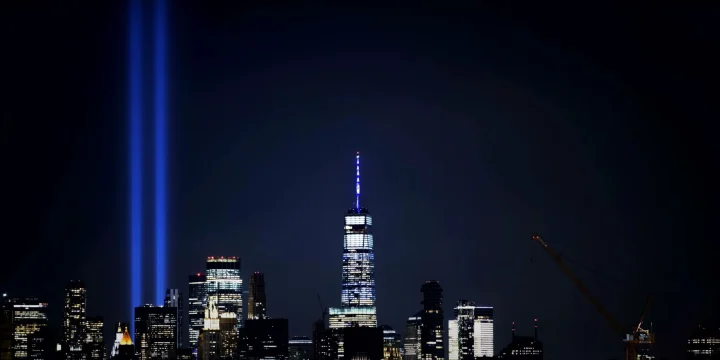
Landmark anniversaries of major events are a good excuse to look back and consider What We’ve Learned in the intervening time. Doing so with September 11 is a dismal venture. The tragedy, which conclusively demonstrated that history had not in fact ended, ushered in a still-ongoing era of widespread paranoia; racism and Islamophobia; an ever-tightening security state; and endless invasions, raids, and other military interventions in West Asia and Africa. In the United States, we are often sternly reminded to “never forget,” as if that were even possible. In a harrowingly brief amount of time, starting on that Tuesday morning, the entire political and social structure of this country reoriented to revolve around this one episode. Over the 20 years since 9/11, the media has of course played a crucial role in this.
The documentary-industrial complex produces films to go along with any event as a matter of course, with the volume of titles generally corresponding to the perceived importance of each one. This is a system that aims to satisfy audience’s desire to “understand” difficult subjects — please bear in mind that this does not necessarily entail informing them well, and it of course has no obligation to produce movies that are, you know, good. Just keeping to the realm of War on Terror-related film, there have been a lot of bad Iraq War docs and a lot of bad Afghanistan invasion docs. But even accounting for the usual weight of worthwhile vs. sloppy work made on a given topic, the sheer number of spiritually vacuous and cynical films about 9/11 is intimidating.
A whole genre has sprung up around basic cable channels producing films dedicated to increasingly narrow aspects of the attacks. Want an excruciatingly detailed play-by-play of that morning? Try this doc, or this one, or this one. Want to learn about the behind-the-scenes politicking that went into the cleanup and rebuilding process after the attacks? There’s a doc for that. Want to know about the hotel at the World Trade Center that was destroyed? There’s a doc for that! The specificity can sometimes approach the absurd — there’s a movie about people who by chance missed being on just one of the planes used in the attack. There’s a movie about the ironworkers at Ground Zero. One of the recent 20th-anniversary films looks at the state of comedy in the wake of the attacks, of all things.
Each one of these forgettable, disposable titles feels lightweight enough on its own, but their cumulative effect has been potent, particularly since they’ve been released over these last two decades as part of the wider media push for a morbid collective obsession with every aspect of the attacks. The gruesome September 11 Museum is also part of this trend. The Tribute in Light didn’t start out that way, but that’s what it’s become. The ceaseless mass destruction we’ve seen in Hollywood blockbusters is another manifestation of it. The pervasive message, explicit or not, is that Americans mustn’t think critically — that there was no context for that day beyond “There are bad people out there who hate us for our freedoms,” to see ourselves as under constant assault so as to justify a constant assault on our designated enemies (most of whom had nothing to do with the attack).
Against these mainstream narratives, the internet age has fostered a healthy ecosystem of oppositional films, just as its aided the rise of conspiratorial theorizing more broadly. The most famous work of the 9/11 Truther movement is of course Loose Change, a continually recut film alleging that the attacks were an elaborate false flag operation (the details shift somewhat from one version to the next). That video is a touchstone not just for trutherism but also for contemporary conspiracy theory culture. (And, oddly enough, for independent filmmaking; it was one of the first longform YouTube hits.) Another influential pillar in this genre is the Zeitgeist trilogy, in which “alternative” explanations for 9/11 loom large. This trend is worrisome, to be sure, but blaming DIY viral video makers for present problems around “fake news” is erroneous.
Culture is at best a copilot to society’s directions, not a leader. The truly influential documentary work around 9/11 has always come straight from our institutions. The most widely seen “films” about that day were not made by any YouTube conspiracy alleger. It’s the footage that played and continues to play on the news. Again and again. And again. And again. Forever. Far beyond the point of traumatizing for its audience. Having more than made sure we’d “never forget,” this material went on to simply numb us. And then the government had a case to make that there were weapons of mass destruction in Iraq, but for some reason that’s not often cited as an example of a damaging conspiracy theory. Perhaps that’s because, rather than try to debunk it, the media was fully complicit in selling it.
There have been a few documentaries that have tried to work outside this paradigm. Rebirth (2011) is a simple but effective film which continually revisits a handful of people who either survived the attacks or lost loved ones that day over the course of 10 years, illuminating their healing process. This year, Spike Lee explored how New Yorkers were impacted both by 9/11 and more recently by the COVID-19 pandemic with NYC Epicenters 9/11-> 2021½. Though it’s been marred by its own controversy around conspiracy theories, Lee’s eye for capturing street-level humanism remains unerring. That there are comparatively so few movies about people and so many which fixate on monumental images of pain or varying degrees of nationalism speaks to how thoroughly “never forget” has been twisted these past 20 years.
0 Commentaires